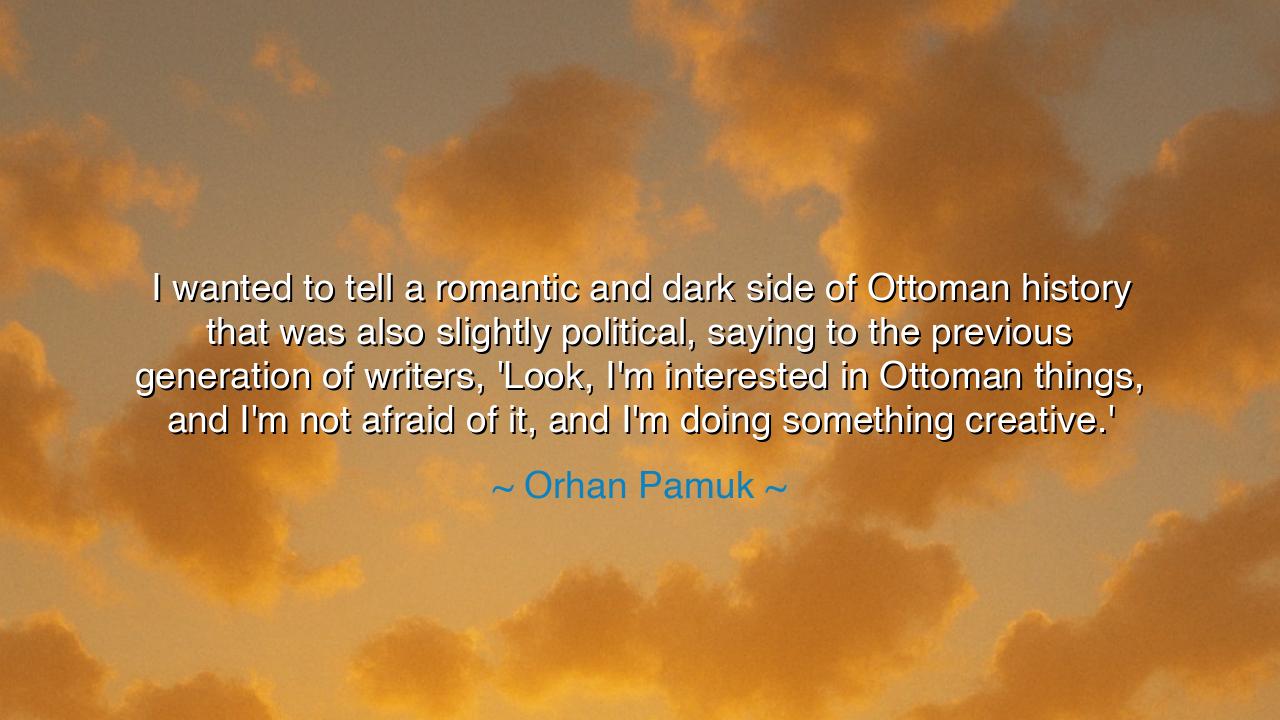
I wanted to tell a romantic and dark side of Ottoman history that
I wanted to tell a romantic and dark side of Ottoman history that was also slightly political, saying to the previous generation of writers, 'Look, I'm interested in Ottoman things, and I'm not afraid of it, and I'm doing something creative.'






Orhan Pamuk, the novelist whose pen weaves both beauty and sorrow, once proclaimed: “I wanted to tell a romantic and dark side of Ottoman history that was also slightly political, saying to the previous generation of writers, ‘Look, I’m interested in Ottoman things, and I’m not afraid of it, and I’m doing something creative.’” In these words lies the defiance of an artist, the courage of a dreamer, and the humility of a man who dares to confront the past. For he reminds us that history is not a dry chronicle of kings and battles, but a tapestry of passion, cruelty, longing, and power—woven with both light and shadow.
The ancients knew well that the telling of history is never free of choice. Herodotus, called the father of history, mixed myth with fact, for he believed that the heart of a people could not be understood without its legends. Thucydides, more austere, sought only the truth of power and politics. Pamuk stands between them: he honors the grandeur of the Ottoman past with a romantic gaze, yet he does not flinch from its dark side—the intrigues, the struggles, the unspoken sorrows that linger behind the palaces and mosques.
Consider the rise of the Ottoman Empire, a civilization that once stretched across three continents, blending cultures, languages, and faiths. To many of Pamuk’s contemporaries, this past was a burden—too heavy, too contentious, too dangerous to touch. Writers turned away, fearful of awakening old wounds. But Pamuk, like a torchbearer in a forgotten hall, dared to walk into that silence. He declared, “I am not afraid.” He sought to capture not only the politics of sultans, but the yearning of lovers, the anguish of betrayal, the mysteries hidden in shadowed chambers.
We see this most clearly in his novels such as My Name is Red, where the tale of miniaturist painters in the Ottoman court becomes not only a romantic murder mystery, but also a meditation on art, tradition, and change. Here Pamuk does what he proclaimed: he shows a dark side—crime, suspicion, conflict of ideas—yet he also cloaks it in beauty, passion, and creativity. It is history, but told with the spirit of the poet, the philosopher, and the lover combined.
There is also courage in his admission that his work is political. To speak of Ottoman things in modern Turkey is not merely to write of the past—it is to wrestle with identity, with the ghosts of empire, with the struggle between East and West. Many of his predecessors avoided this, fearful of controversy. Pamuk instead chose creation over silence, and by doing so, he challenged both the older generation of writers and his own nation to confront memory with honesty. His art was not passive—it was a dialogue with power, with tradition, with the future.
The lesson for us is this: we must not fear the dark side of history, nor should we reduce it only to politics. Instead, we must see its full breadth—its love, its violence, its grandeur, its tragedy. To approach the past with both romance and truth is to honor it fully. And like Pamuk, we must dare to be creative in how we remember, lest the silence of fear erase the stories that shaped us.
So I say unto you, seekers of wisdom: do not shrink from the shadows of your heritage. Whether it is the story of a people, a family, or your own life, face it boldly. See its romance, its beauty, its vitality—but also its darkness, its pain, its wounds. Speak it, write it, create from it. For in doing so, you will, like Pamuk, stand before the generations and declare: “I am not afraid. I am doing something creative.” This is not only art—it is the path to truth, to healing, and to freedom.






AAdministratorAdministrator
Welcome, honored guests. Please leave a comment, we will respond soon